
Shifting Support for Democratic Party Among American Elderly
Findings from the Blair-Rockefeller Poll
On the heels of the 2010 mid-term elections, the Diane D. Blair Center of Southern Politics and Society, together with Winthrop Rockefeller Institute, conducted a comprehensive online national poll of political attitudes and behaviors. The Blair-Rockefeller Poll oversampled participants from the Southern region of the United States, as well as oversampling African Americans and Latinos, providing unique perspectives on contemporary politics. With over 3,400 respondents from across the nation, the Blair-Rockefeller Poll provides a comprehensive and uniquely accurate perspective on how the country evaluates public figures and current public policies.
Topic Report:
Shifting Support for Democratic Party among American Elderly
By Todd Shields, Director of the Blair Center of Southern Politics and Society
Following the recent Republican take-over of Congress and their reported gains among elderly voters, the Blair-Rockefeller Poll included several questions asking respondents about their overall evaluation of President Obama, recent reforms, and overall support for the Democratic Party. To the extent to which the Democratic Party has lost support from one of its most traditional core groups, changing party support among the elderly has dramatic implications for the 2012 presidential election and American politics more generally.
First, we asked participants about their party identification and found that those 65 and over were more likely to say that they were a ‘Republican’ than were those under 65 years old. In fact, while 48 percent of respondents 65 and over reported that they were Republicans, only 33 percent of those under 65 indicated that they were Republicans. On the Democratic side, only 39 percent of participants 65 and over indicated that they were Democrats while 43 percent of those under 65 indicated that they were Democrats.
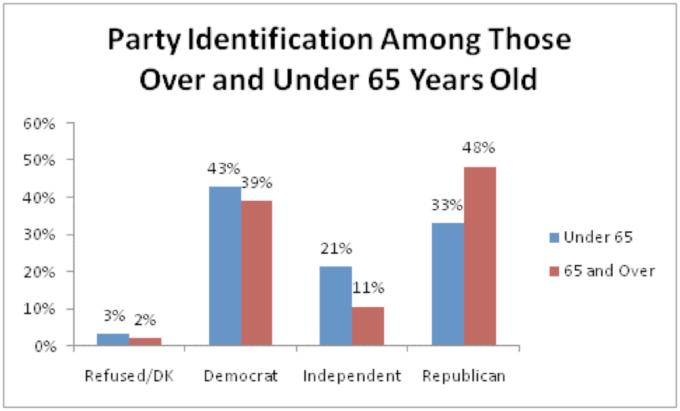
Looking at ideology, we found additional support for the GOP. Specifically, we found that 48 percent of those 65 and over reported that they were conservative compared to 37 percent of those under 65. Older participants were also less likely to indicate that they were moderate (24 percent among those 65 and over compared to 30 percent among those under 65) or liberal (just 14 percent of those 65 and over compared to 22 percent among those under 65).
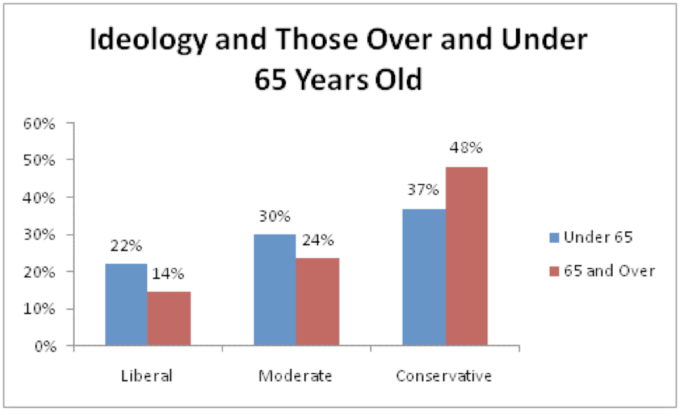
Older respondents were clearly more Republican and more conservative than their younger cohorts and these political attitudes were evident in their behaviors as well. First, only 12 percent of respondents over 65 indicated that they did not vote in the 2010 midterm elections, compared to 42 percent of non-voters among those under 65 years old. Among the older participants 49 percent indicated that they voted for a Republican congressional candidate while only 26 percent of those under 65 voted for a Republican congressional candidate – a 23 point gap in favor of the Republican Party among a group that is highly involved in contemporary political life.
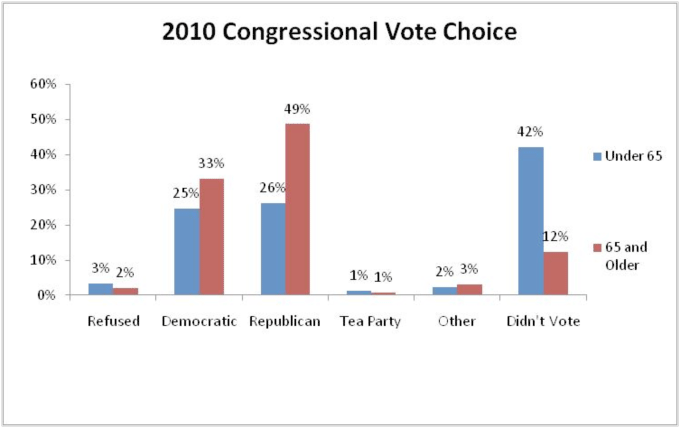
The same type of Republican advantage was also found in Senate vote choice. Not only were older respondents more likely to vote (46 percent of respondents who were under 65 reported that they did not vote, compared to only 18 percent among those 65 and older) they were also much more likely to report voting for a Republican Senatorial candidate. Among those 65 and older, 41 percent voted for a Republican Senatorial candidate compared to just 24 percent among those under 65 years old – a 17 percent Republican advantage.
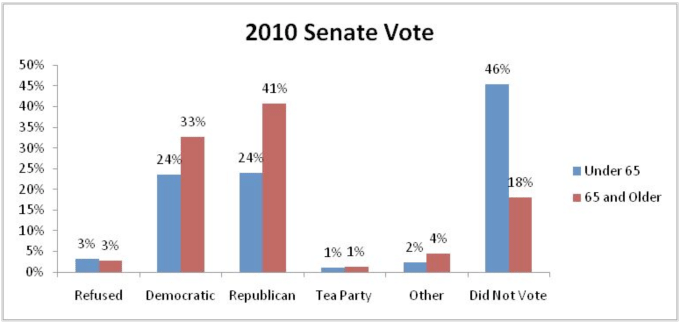
This general tendency for those 65 and older to support Republicans in the 2010 midterm election was not isolated to evaluations of congressional candidates. Looking specifically at how respondents evaluated President Obama, we again see the substantial obstacles that the Democratic Party, and President Obama, in particular, face among those Americans 65 years and older.
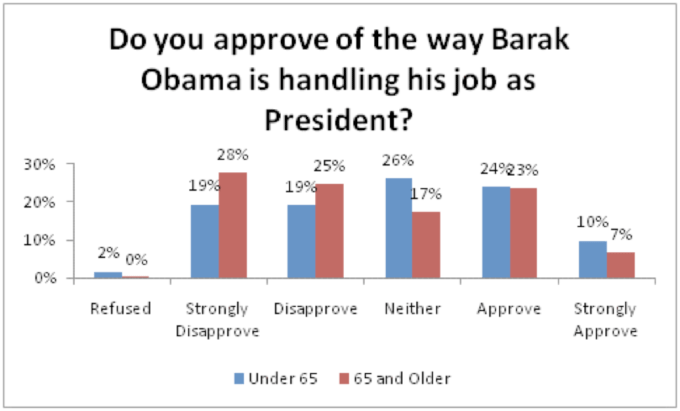
While 38 percent of respondents under 65 years old reported that they either ‘disapprove’ or ‘strongly disapprove’ of the way Barack Obama is handling his job as president, 53 percent of those 65 years old and older reported that their either ‘disapprove’ or ‘strongly disapprove’ of the way Barack Obama is handling his job. With over half of those 65 and over reporting disapproval of the way the president is handling his job; the Democrats have a difficult road ahead of them if they hope to recapture the presidency in 2012. Democrats will need to reach out to older voters, try to bring younger people to the polls, and attempt to reach out to an aging and largely conservative America.
Variations across Race and Region
One of the unique features of the Blair-Rockefeller Poll is the large sample size – including oversamples of people living in the South (defined as living in one of the eleven states of the Confederacy), Latinos/Hispanics and African Americans. Such a large oversample provides one of the only opportunities to rigorously compare elderly populations across race and region. Looking first at party identification among older respondents (those 65 years and older), we see substantial differences across region and race.
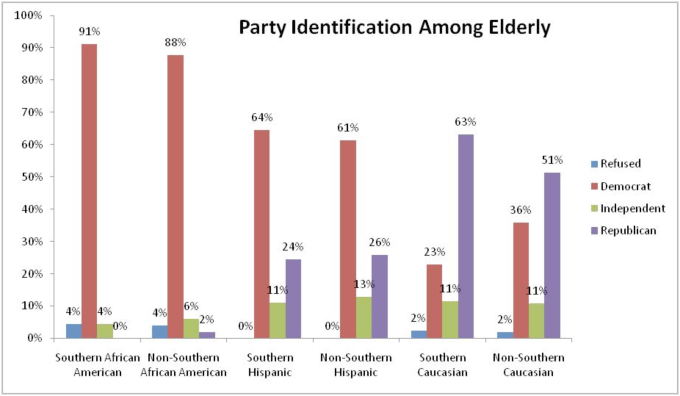
Reading the above figure from left to right, we find that while elderly African Americans overwhelmingly identify themselves as Democratic Party supporters, the percentage is slightly higher among elderly southern African Americans. Among this group, there is very little support for the Republican Party. There are similar gaps among Hispanic/Latinos with a slighter greater percentage of elderly southern Latinos identifying with the Democratic Party. Democratic Party identification among elderly Latinos, however, is significantly below that of elderly African Americans. In addition, while the vast majority of elderly Latinos identify with the Democratic Party, approximately a quarter of elderly Latinos identify with the Republican Party (24 percent of elderly southern Latinos and 26 percent of elderly non-southern Latinos). Among Caucasians, the pattern is reversed – a substantially greater percentage of elderly Caucasians identify with the Republican Party. Further, support for the GOP among elderly Caucasians is substantially higher in the South with 63 percent of this group identifying with the Republican Party.
We find a similar pattern looking at ideology among elderly across race and region.
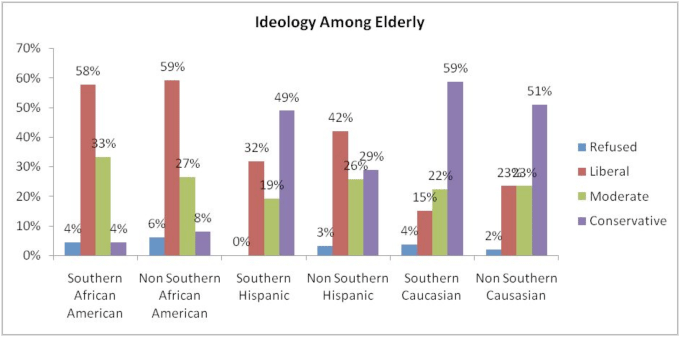
Looking first at elderly African Americans, we find that the vast majority indicated that they were liberal and there was only a slight difference between southern and non-southern African Americans. Among elderly Hispanics, however, we see some surprising differences. Only 32 percent of southern Hispanics indicated that they were liberal while 19 percent reported that they were moderate. The remaining 49 percent of elderly Hispanics indicated that they were conservative. Among non-southern elderly Hispanics, however, only 29 percent said they were conservative while 42 percent indicated that they were liberal. These differences strongly suggest that the elderly southern Hispanic residents are significantly more conservative than their non-southern counterparts and substantially more conservative than southern or non-southern African Americans. Looking next at elderly Caucasians, we again see a pattern for greater conservatism in the South. Among elderly southern Caucasians, 59 percent indicated that they were conservative while 51 percent of elderly non-southern Caucasians reported that they were conservative. Among elderly southern Caucasians, only 15 percent indicated that they were liberal and only 23 percent of their non-southern counterparts indicated that they were liberal.
The differences across party identification and ideology become more meaningful when we look at the voting behavior of elderly respondents in the 2010 midterm election.
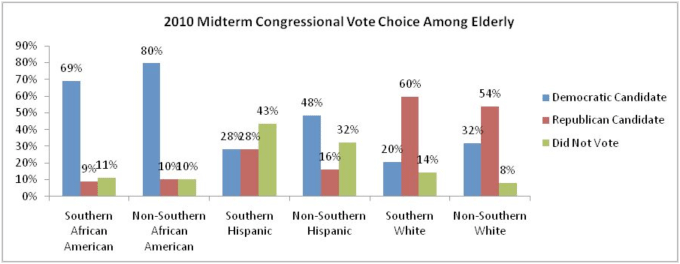
Looking first at elderly African Americans, we see that the Democratic Party identification and liberal ideology of this group resulted in overwhelming support for Democratic Congressional candidates. Among southern elderly African Americans, 69 percent indicated that they voted for a Democratic congressional candidate while 80 percent of elderly non-southern African Americans voted for a Democratic congressional candidate. Very few elderly African Americans indicated that they voted for a Republican congressional candidate or did not vote. Clearly the Democratic Party benefited in the 2010 midterm elections from the support and turnout of elderly African Americans. Among elderly Hispanics, particularly among those living in the South, we see a substantial percentage indicating that they did not vote. In fact, 43 percent of southern elderly Hispanics indicated that they did not vote compared to 32 percent of their non-southern counterparts. Further, among southern elderly Hispanics, there was an even split between their support for Democratic and Republican Congressional candidates. To the extent to which southern elderly Hispanics are divided between the two political parties, their low turnout rates represent an opportunity, and a potential battleground, for both political parties. Finally, among elderly Caucasians, we see the continued pattern of southern support for Republican Congressional candidates. Sixty percent of elderly southern Caucasians indicated that they voted for a Republican Congressional candidate compared to 54 percent of non-southern elderly Caucasians. Among southern elderly Caucasians, only 20 percent voted for a Democratic congressional candidate. Importantly, the percentage of elderly Caucasians who did not vote was also comparatively low, with 18 percent of elderly southern Caucasians and only 8 percent of non-southern elderly Caucasians.
Looking next at votes for the 2010 Senate races, we find similar patterns.
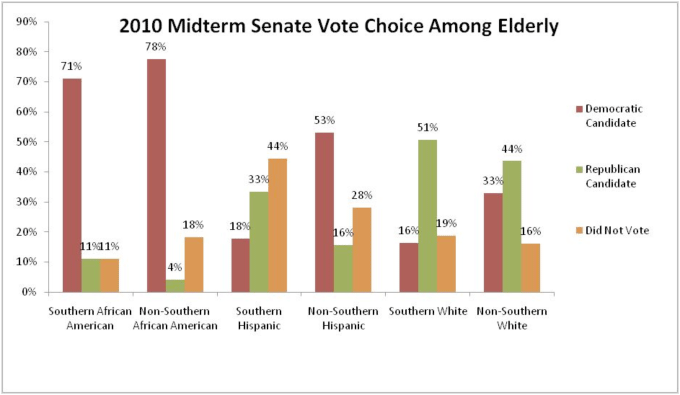
As in the congressional race, we see that a very large percentage of both southern and non-southern elderly African Americans voted for the democratic Senatorial candidate. Also similar to the Congressional races, we find that very few southern and non-southern elderly African Americans voted for a Republican candidate or did not vote at all. Interestingly, however, there was a slightly higher percentage of non-voters among elderly African Americans in the non-south (18 percent) compared to the south (11 percent). Among elderly Hispanics, we again see greater support for Republican candidates, particularly in the South. Among elderly southern Hispanics, we find that while only 18 percent voted for a Democratic candidate, 33 percent voted for a Republican candidate and 44 percent reported that they did not vote. Among southern elderly Caucasians we again see a larger percentage of voters supporting Republican candidates with 51 percent of respondents voting for Republican Senate candidates compared to 44 percent of elderly non-southern Caucasians. Among elderly non-southern Caucasians we find somewhat higher support for Democratic Senatorial candidates with 33 percent indicating that they voted for Democratic Senate candidates compared to just 16 percent among southern elderly Caucasians. Regardless, even this amount of support declined to just 16 percent among elderly southern Caucasians.
2012 Battlefield
Overall, the results of this survey indicate that the traditional base of support among older voters that Democrats have relied upon since the partisan realignment following the New Deal continues to weaken. While older voters continue to vote in high percentages, compared to younger cohorts, clear support for the Democratic Party is confined largely to African Americans. While older Hispanics generally favored the Democratic Party, they showed substantial willingness to vote for Republican Senatorial candidates in the 2010 midterm election. Further, the traditional Democratic support among older Caucasians continues to decline, particularly among older Caucasians living in the South. If these trends continue, the 2012 presidential election will require the Democratic Party to continue to bring young, and often unreliable, voters to the polls. Further, the Democratic Party must continue to make inroads into the growing Latino/Hispanic population. If the GOP is able to maintain its grip on older voters in the South, that tend to not only vote at high rates, but are also overwhelmingly conservative, Republican and willing to support GOP candidates the Democratic presidential campaign strategy will be forced to continue building winning coalitions without the assistance of most of the southern states. With growing populations and over one-third of the Electoral College votes needed to win the Electoral College, losing support among the elderly is an important trend that scholars must continue to monitor.
Methodology
The Blair-Rockefeller Poll is a national survey that was fielded immediately following the November 2010 midterm elections. Its representative oversample of Caucasians, African Americans, and Latinos living in the South and in the continental non-South makes it, consequently, the only rigorous academic survey with a specific focus on the South, African Americans, and Latinos.
The Blair-Rockefeller Poll was administered by Knowledge Networks (www.knowledgenetworks.com), an internet-based survey company that includes a representative sample of Americans in its proprietary data base, including representation of the roughly 30 percent of U.S. households that do not have internet access. In addition, it covers the growing number of cell phone-only households (recently estimated at 23 percent of all households) through address-based sampling.
The survey probed national and regional issues of concern to the population of the United States and was conducted in both English and Spanish. The average survey took 21 minutes to complete.
The 2010 Blair-Rockefeller Poll included a total sample of 3,406 individuals, who were 18 years and older. This included 1,649 White, Non-Hispanic respondents; 825 African Americans; and 932 Hispanic Latinos. In regional terms, there were 1,689 respondents living in the South and 1,717 respondents living outside the South.
Contact:
Todd Shields, Ph. D.
Professor, Department of Political Science
Director, Diane Blair Center of Southern Politics and Society
University of Arkansas
479-575-5900, tshield@uark.edu